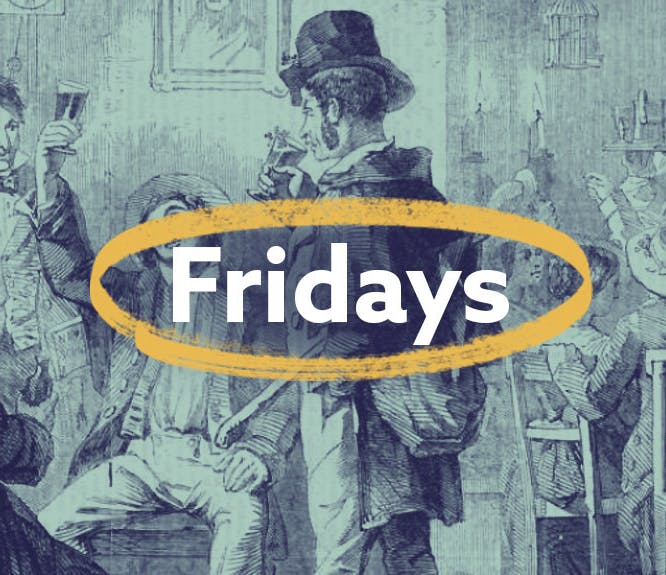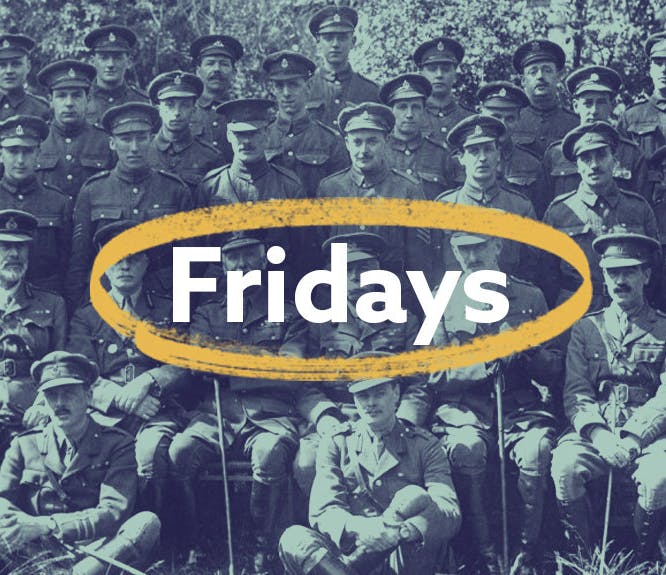15 pro tips for searching British & Irish newspapers on Findmypast
5-6 minute read
By The Findmypast Team | May 3, 2023

Findmypast's historical newspaper archive collection is a potential goldmine of information on your ancestors. Here's how to make the most of it.
With millions of articles from thousands of publications, our British and Irish newspapers are an unrivalled family research resource. Not only can you search for your ancestors in them, but they are also fantastic for learning about the world in which your relatives lived. Plus, it's always fascinating to see how historical events were reported as they unfolded.
To help kick-start your newspaper research, we've compiled 15 expert tips from our team of in-house newspaper gurus. Got a question about the papers that isn't covered on our list? Reach out to the Findmypast Forum for help from our thriving community.
1. Get started for FREE
Millions of pages in our newspaper archives are free to search and view, giving everyone the chance to unearth rich family stories they won't find elsewhere. Select 'Free to view' from the 'Article access' filter on the newspaper search page to see what's free.
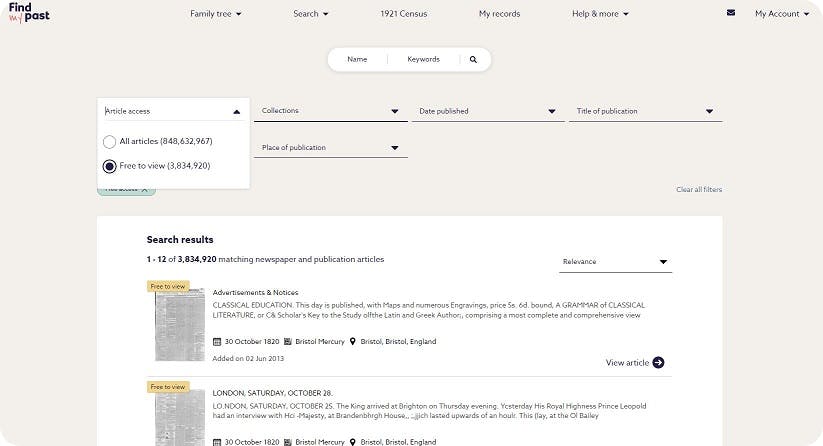
What's more, there'll be millions of extra pages added to our free-to-view collection in the coming years in partnership with the British Library.
2. Begin with a broad search
Start searching Findmypast's British and Irish newspaper archive with a name or keyword and narrow your results with our range of filters. You can filter by article access, collections (British or Irish), date, locations (place and county) and newspaper title.

Choose multiple filters at the same time to quickly and easily pinpoint what you're looking for. You can also sort your search results by relevance, the date the article was originally published and the date it was added to the site.
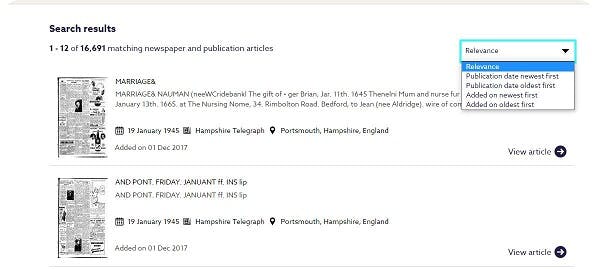
To achieve the most accurate search results, always start with a name and be as specific as possible.
3. Look out for family tree information
Birth, death and marriage notices were commonplace in old newspapers. That's why they're so useful for adding new facts to your family tree.
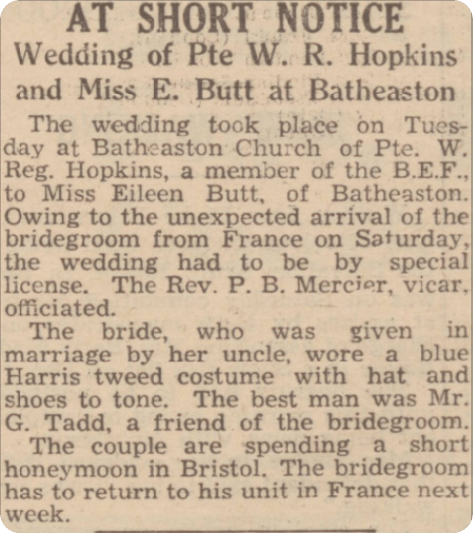
A wedding notice featured in the Bath Chronicle and Weekly Gazette, 1940.
If a birth notice was printed in your ancestor's local paper, the names of both parents were usually included. Wedding notices might feature the names of other guests, such as the maid of honour or the newlyweds' parents.
4. Cross-reference with other family records
If, for example, you want to find parents' details and you only know their child's name, your best bet would be to look for birth or baptism records before looking in the newspapers.

An example of an English Roman Catholic baptism record, with both parents names. View this record here.
However, once you've done this, you can compare sources and fact-check your information.
5. Look for the language of the time
For example, if you were looking for a story about suicide, you should also consider searching for the euphemisms of the day, such as 'did away with himself.' Another example may be looking for the outdated term 'lunatic' when searching for an asylum patient, or the word 'infirm' when searching for someone disabled.
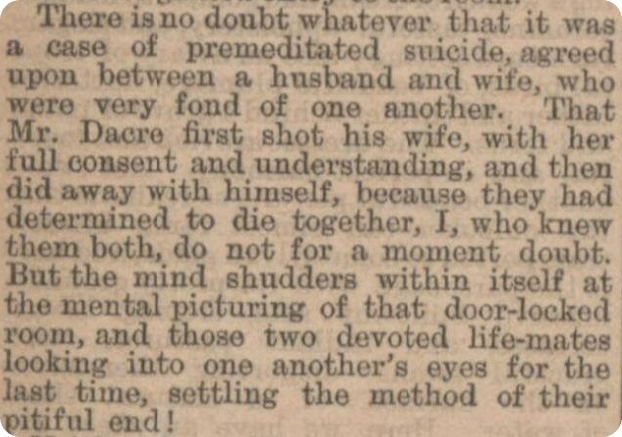
An example of a murder-suicide reported in the The Stage 1895.
Newspapers tended to use more formal language for the most part, but look for several phrases and terms to maximise your chances of getting meaningful results.
6. Beware of misprints
Sometimes names and other details were misspelt by the journalist who originally wrote them down, particularly in older papers. You can use wildcard searches to get around this. Use quotation marks around a phrase to get search results for those exact words. Adding a plus or minus sign before a search term will instruct our clever search to include or exclude that word in your results.
7. Understand how digitisation works
The information on our newspaper pages is automatically captured, so your search may not always be 100% accurate. We use optical character recognition (OCR) technology, the best method for quickly capturing a large volume of information. This allows us to publish thousands more pages every week.
8. Make use of our handy tools
Our online page viewer allows you to zoom in and out and quickly find where your search criteria are mentioned on a page. But if you'd prefer to read offline, you can also download a page and save it forever.
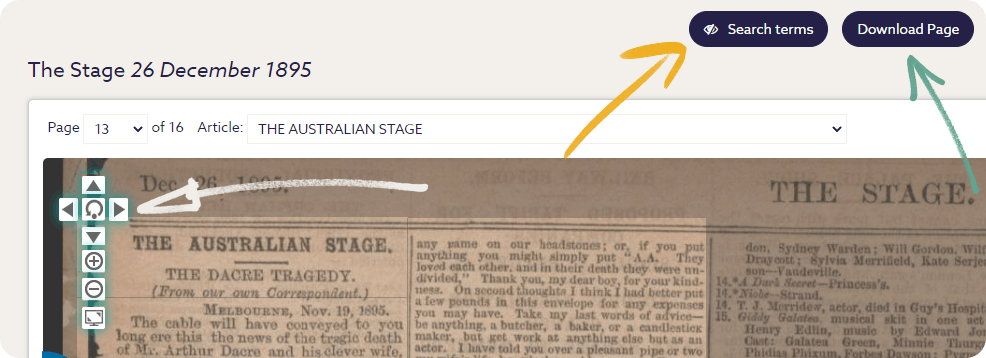
Use the viewer's arrow tools to move around a page, while the circular icon in the middle of the arrows resets the viewer, showing you the entire page without any highlights. If you want to focus on the page without distraction, the screen icon at the bottom of the arrow controls offers a full-screen view. The 'search terms' button highlights the words you searched for so you can find them instantly on the page.
9. Check the coverage
You can use the newspaper title filter to select the publication you are most interested in. The date filters reflect which years are covered by that title. We also feature the years added each week in our Findmypast Fridays updates.

This will help you decide if the publication is relevant to you, and you can narrow down your search from there.
10. Explore Irish roots
There's a substantial collection of Irish newspapers dating back to the 1700s on Findmypast.
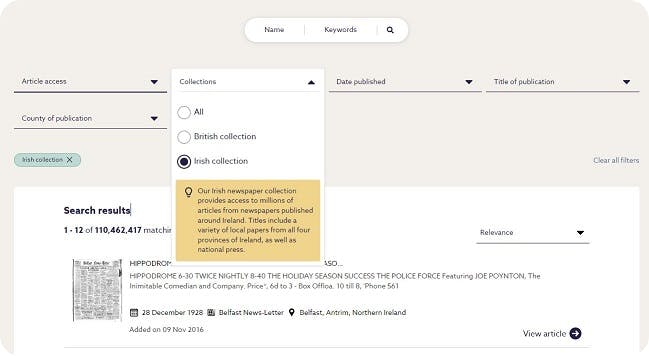
Select our Irish newspapers using the 'Collections' filter. The search features work the same way for British and Irish newspapers. You'll find millions of articles on current affairs, local news, and international relations.
11. Choose local, regional or national papers
Our vast newspaper collection includes lots of regional and local titles. Find the ones you're most interested in using the newspaper title, county and place filters and searching for a county, town, or village. Local papers often reported on changes in infrastructure, such as street name changes, which can prove very useful for one-place studies or house history.
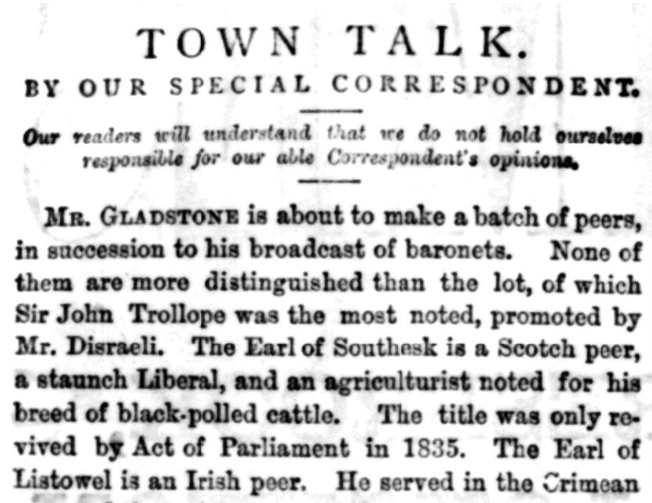
'Town Talk', Woodford Times, 1869.
They'll also sometimes have local affairs columns. The Woodford Times, for example, featured a section called 'Town Talk', which contained local London news from an external correspondent.
You can also see how the national news of the time was reported in major papers like Daily Mirror, Irish Independent and Daily Herald (the precursor ofThe Sun).
12. Uncover crime, court and crisis reports
Newspapers are rich historical sources for all social classes. The court reports of the time are recorded in great detail. You'll also discover local news stories you won't get elsewhere, so searching for a parish or town is a great place to start.
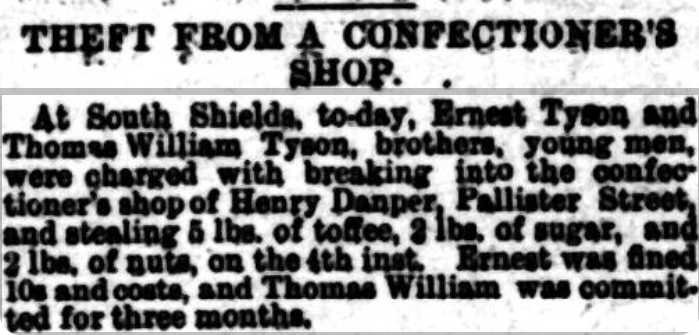
Court sessions will often include full names. Shields Daily News, 1910.
During periods of crisis like the Irish Famine, you'll also find stories of the struggles of ordinary individuals, all of whom are likely to be named.
13. Unlock Welsh family wonders
Our newspaper collection includes dozens of newspapers from all over Wales. Some of them are Welsh language papers, such as Baner Ac Amserau Cymru.
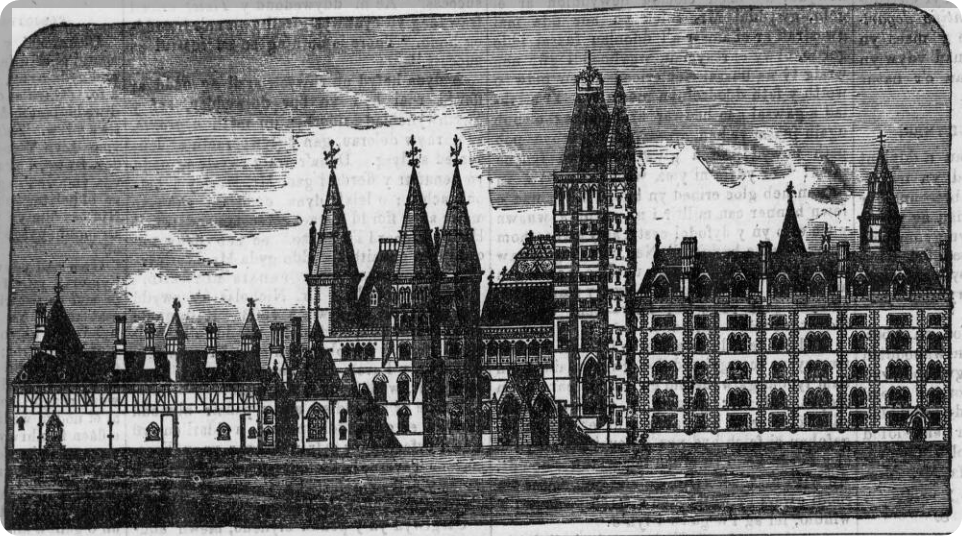
An illustration featured in Baner Ac Amserau Cymru, 1868.
Use the place filter and type in Wales to see what's available. For more Welsh family history tips, check out our handy guide.
14. Stay up-to-date
We publish new papers and update existing ones with additional pages each week on Findmypast Friday. All the latest arrivals will be covered in your weekly email (make sure you're signed up to receive it), here on the blog and on Fridays Live, our weekly community live stream.
It's always worth checking back regularly - you're bound to discover something new.
15. Share your discoveries
We love hearing where your past has taken you and our newspapers could take you further into it than other sources.
Drop us a line on Facebook, Instagram or Twitter, or complete this form to tell us what you've found and how our newspapers have helped shape your family story.


